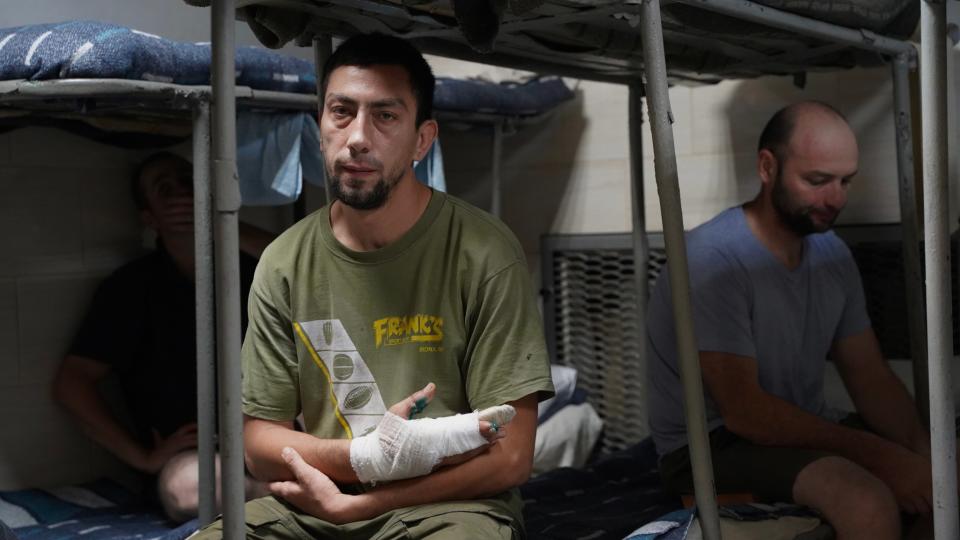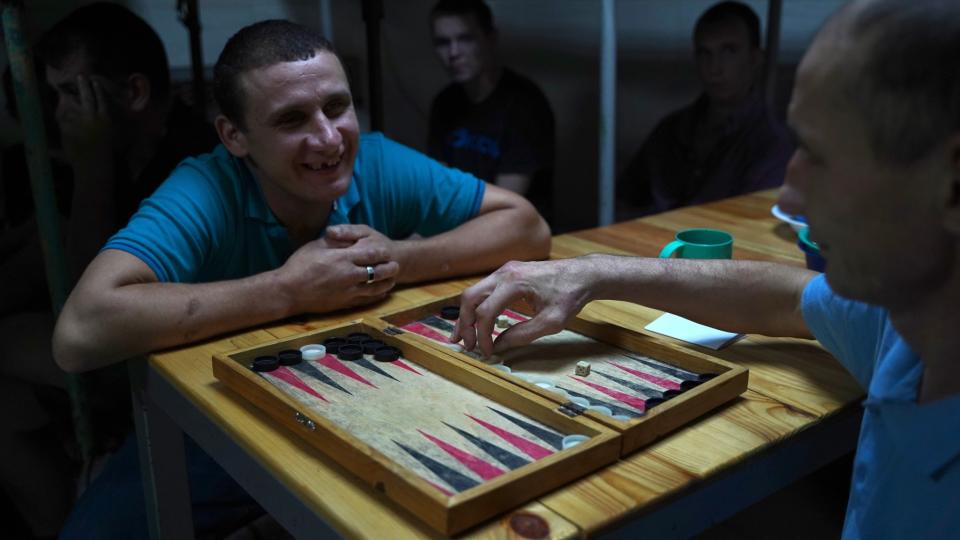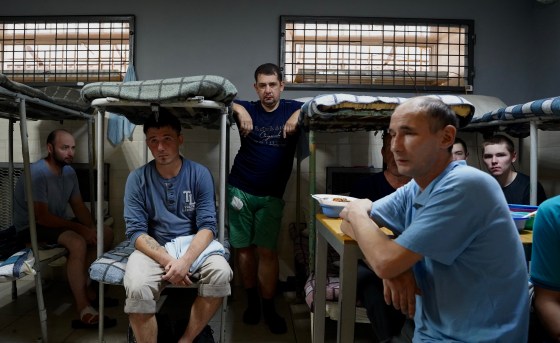
NORTHERN UKRAINE — A strong smell of cigarettes and sweat, mixed with the scents of a school cafeteria, fills the hallway as a Ukrainian guard escorts us through the prison.
A little further on, a guard with a Cossack moustache escorts a Russian prisoner of war. The prisoner wears oversized trousers and his face is tired. His arm is wrapped in a bandage soaked in blood and yellow fluid, with an iron rod stuck directly into the bone on top of it, holding his fracture in place.
“We’re taking him to the sickbay,” the guard said.
Another guard, with a smooth turn of a key, unlocks the enormous green iron door and escorts my translator and me into the room. Behind it, a dozen Russian POWs are crammed together. (In exchange for access to the prison, we agreed not to reveal its precise location. The prisoners we met agreed to be interviewed and to be photographed.)
They were all captured by Ukrainian forces during their offensive in the Kursk region in early August. Since then, the flow of Russian prisoners has not stopped and could reach several thousand, one of the Ukrainian guards said.


Askerkhan, a 30-year-old prisoner, steps forward. His face, covered with a small black beard, is emaciated. His hand, wrapped in a bandage, is wounded. “A bullet broke my finger.”
Three months after his military service, Askerkhan and his unit were overrun by the Ukrainian army. He is one of the few survivors.
“The conscripts surrendered as soon as the first shots were fired,” Askerkhan explains with a shrug. “Those from the naval units who tried to resist were crushed.”
Disillusioned, Askerkhan even dares to criticize his superiors: “Why did they only send conscripts to defend the border?”
The prisoners sit around a small table with a television and eat a mixture of porridge and stew from plastic bowls, accompanied by a cucumber salad, coarsely chopped with dill.
The wounded lie on their bunks, staring blankly at the ceiling of their cells, blowing away the flies that land on their faces.
Other prisoners, in a corner, are playing backgammon, enjoying a moment of relaxation in the stifling summer heat, with a smile on their faces. They know they will soon be exchanged.
Ukrainian President Volodymyr Zelensky has said that one of the reasons for the offensive was also to capture Russian prisoners to fill their “swap fund.” On August 24, the day after our visit, Ukraine and Russia completed a prisoner exchange of 230 soldiers, 115 for each side. It is unlikely that any of the men we spoke to were involved in that exchange.
Respect for the Geneva Conventions.
A 19-year-old conscript who asked to be called Rustam (not his real name) had just three months left before his military service was due to end. Rustam has been stationed in the region since mid-April and is one of hundreds of conscripts captured during the offensive.
Without proper equipment and experience, many surrendered as soon as the fighting began.
“Our superiors sent us (to Kursk) and told us that (the Ukrainians) were gathering their troops on our border. But once we got there, no one gave us any orders,” he explained.
Rustam, who comes from Dagestan in the Caucasus, told about the first days of the offensive.
“We drove and drove (to another position), and then a drone hovered over us. It exploded, and that was it — the shrapnel hit my finger,” said Rustam, who has a thick bandage and a splint on his left hand. “Then we were captured by the Ukrainians.”
Andrey, a 31-year-old contract soldier, had no time to understand what was happening to him. “I signed a contract on July 23 and was captured on August 7,” he explained, almost desperately.
Andrei is surprised by the Ukrainian offensive and explains that he did everything he could to stop the advance.
“We came under Ukrainian fire during our retreat. Almost our entire unit was decimated. Those who survived were taken prisoner. As they say, you can’t stop a tank with a machine gun.”


Yevgeniy, 22, was called up for military service right after graduating. He said he was surprised by the Ukrainian advance and, after a brief silence, admitted that he never supported the war.
Today, they all seem to be biding their time, hoping to be released soon. Yevgeniy said after his release that he planned to resume his studies. “I would like to study languages. Maybe English.”
Rustam is more evasive. He hopes to return to Dagestan and resume his job as a mechanic.
Andrej explains that he and his comrades have been treated well since his arrival.
“Our officers said we would be tortured if captured,” added Rustam, who admitted in an almost inaudible voice that he had never believed them.
“We expected a different reception, but we got normal humane treatment,” Andrey continued. “We are fed and given all the daily necessities. We are treated like people, even though we are prisoners.”
Red Cross workers came last week and Andrey and other prisoners were able to write letters to their families in Russia.
Rustam has only recently arrived and has not yet had the opportunity to do so.
With a tense look, an officer of the Ukrainian armed forces responsible for transferring prisoners of war explained that Ukrainian prison staff strictly adheres to the Geneva Conventions.
But between courses he confided his frustration. “They are our enemies above all, and what we do for them is already too much. I can assure you that it is no pleasure to take them to the hospital and take care of them.”
Many of them, the guard explained, were in a pitiful state when they were found. “I have heard that some were abandoned by their commander and have not eaten for more than three days. Here, as soon as they arrive, they are immediately cared for, fed and treated.”
Askerkhan wanted to thank the Ukrainian combat doctors under the watchful eye of the guards.
“They didn’t differentiate between us and their own people,” he explained. “Here, no one threatens us and we are treated well, whether by the guards or the doctors. I wish our soldiers treated Ukrainian POWs the same way they treated us.”
Iryna Matviyishyn contributed to the reporting.







